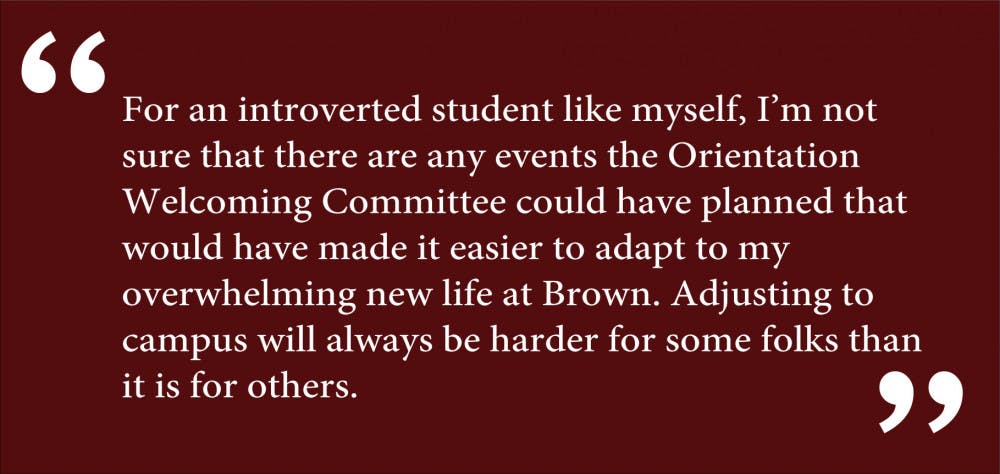Recalling first-year orientation brings back little besides the sensation of immense loneliness. Watching as my peers made fast friends with each other, feeling like an outsider observing social rituals conducted in a foreign tongue. I didn’t connect to anyone that first week at Brown, or the second. As my first semester slogged on and I still had trouble “connecting with the community of (my) peers and the larger campus and local communities” — one of the explicit goals of Brown’s orientation — I felt as though I had failed. I wasn’t a Brown student, just some imposter hiding out in the first-year complex called Keeney Quad.
No one told me that the process of orienting yourself to the Brown life doesn’t end with orientation. Orientation provides a crash course introduction to all things Brown: the campus, the classes, the traditions. But no matter how carefully planned, a few days of introduction will never be enough to ease the paths of many first-years.
To be sure, there are students who arrive to Brown’s campus and immediately thrive. Traditions like the new student ice cream social and the annual orientation dance wouldn’t be such mainstays if no one enjoyed them. The Orientation Welcoming Committee works hard to facilitate activities that leave a lasting impact on first-year students.
These experiences, while valid, are not representative of what all students go through. A number of recent posts on a Facebook page where Brown students anonymously submit crushes and confessions offers a look into how many first-years finish orientation without finding a sense of belonging. One begins by asking, “Can someone please tell me when I’m supposed to start liking Brown?” Another first-year admits, “I don’t even feel like I’m happy to be here.”
It would be easy to dismiss posts like these as outliers, or to call students who feel disconnected from the campus overdramatic or impatient. After all, it’s been less than a month since school began. Of course not everyone can find their place in such a short amount of time.
But in a recent article titled, “The Real Campus Scourge,” New York Times op-ed writer Frank Bruni points to the immense consequences of loneliness among new college students. Bruni argues that the sense of not belonging “can be a gateway to binge drinking and other self-destructive behavior.” He suggests that students who feel out of place are more likely to end up dropping out.
Bruni points to “extended, elaborate freshmen orientation schedules” as being “another intended prophylactic against loneliness.” And yes, the more orientation options are offered to students, the more likely it is that they’ll find friend groups with whom they belong. Events like yoga or the annual LGBTQ welcome dinner offer students the chance to connect with others in a smaller setting, one less chaotic than the new student ice cream social or the post-convocation barbeque.
For an introverted student like myself, I’m not sure that there are any events the Orientation Welcoming Committee could have planned that would have made it easier to adapt to my overwhelming new life at Brown. Adjusting to campus will always be harder for some folks than it is for others.
What’s needed to combat student loneliness isn’t a more extensive orientation, but rather a disclaimer given during mandatory events, like unit meetings or panels: You may not immediately find your place at Brown. You may not make friends right away. It’s not wrong to feel like you don’t belong, or to reach out to resources like Counseling and Psychological Services.
We need to make it explicitly clear to first-years that the students who come to Brown and immediately feel a sense of belonging are the lucky ones, not the norm. Perhaps they came to A Day On College Hill when they were first accepted and formed lasting friendships there; perhaps they networked in their class’s Facebook groups and arrived ready to bring virtual friendships to life. For all of those students who come in to an instant sense of community, there are those students — of which I am one — who still sometimes struggle to feel like they have a place here. There are seniors who graduate feeling ambivalent about their time at Brown, unsure if they ever belonged.
Orientation isn’t a week-long process, but rather a journey to belonging that takes days for some and years for others. When we acknowledge that becoming part of Brown’s campus is a process without a time limit, perhaps we can begin having conversations about loneliness that aren’t limited to anonymous online forums.
Caroline Mulligan ’19 can be reached at caroline_mulligan@brown.edu. Please send responses to this opinion to letters@browndailyherald.com and other op-eds to opinions@browndailyherald.com.



